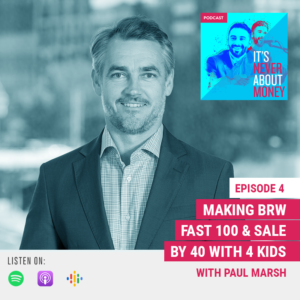Paul Marsh is the owner and co-founder of P2 Group, a specialist consulting company that assists employers proactively manage occupational health cover and workplace compensation claims.
Paul built a successful business from the ground up, making the BRW Fast 100 in 2012. And, at the tender age of 40, Paul went through a liquidity event transition, selling his business to global insurance brokerage firm, Gallagher. Paul had the unique opportunity to see the transition-out process for his own business play out in front of his very own eyes, while still continuing to work in the business.
So while Paul and his business partner, James, had worked hard to get their business to where it was, they hadn’t yet considered an exit strategy. And at that age, you don’t.
But the opportunity for Paul to sell P2 Group came as a living case study on how to manage the transition out of your business; albeit in somewhat different circumstances.
It’s always hard, as a business owner, to relinquish that control. But the opportunity to sell allowed Paul to avoid many of the mental traps awaiting business owners.
Under new management in this way the business would continue to grow and flourish without him, and his team could continue on in their roles. Selling the business, but still working in it, provided him a fantastic opportunity to continue to generate an income post exit. And he didn’t have to worry about losing any business identity he’d spent so long cultivating.
Paul hasn’t really had the chance to leave a business to his kids. But now, instead of a legacy of a business, his legacy is his work ethic. Of working hard, being a good corporate citizen, and placing a priority on one-to-one, human interaction.
His motivation didn’t die with the business transitioning. In fact, it’s only gotten stronger. He’s got more to prove now, but more opportunity to prove it.
So while it came with some tough decisions, Paul knows that selling his business was a fantastic opportunity.
So while he might not be leaving a business to his children, he’s still able to leave a legacy.
To hear the full conversation, listen to episode 4 of It’s Never About Money.







